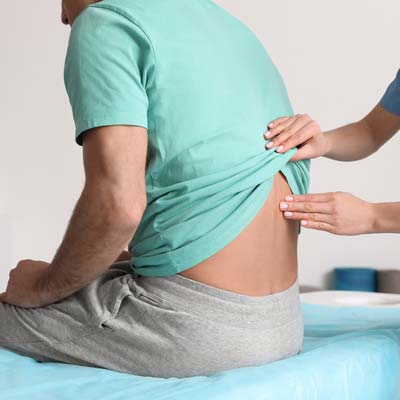Is Spinal Decompression Right For Me?

Our spine is a complex part of our body with two main functions. The first function of the spine is that it keeps us upright. Second it protects our spinal cord. Unfortunately, if we do not take care of our spine, over time we may be prone to developing different back and neck conditions. Some of these conditions may be: chronic back and neck pain, stiffness or lack of mobility, sciatica, stenosis, herniated discs, arthritis, leg and arm pain, headaches and more.
Our spine is constantly under pressure throughout our day. From gravity alone the spine can face abnormal pressure (from abnormal posture) that can ultimately lead to the nerves and soft tissues of the spine being compressed. When these structures are under abnormal loading, they start to become compromised and are at higher risk for injury. With this information, it is important to be conscious of our necks and backs and the way we hold and maneuver them throughout our day. Practicing correct lifting habits, not twisting abruptly, and even just sitting with proper posture are extremely important because over time, if these habits are not established, back and neck injuries may occur.
One of the most common back injuries is a herniated disc. A healthy disc sits between the vertebrae and acts as a shock absorber against gravity. Herniated discs occur, usually suddenly, when some of the material in the center of the disc has come out and puts pressure on the nerve or spinal cord. This injury can occur anywhere in the spine, but it is most commonly found in the lower back or lumbar region of the spine. Herniated discs may be mild, moderate or severe. A herniated disc can quickly turn into back and/or leg pain, loss of muscle tone and strength, loss of reflexes, and more if not addressed. Our spine (and brain) are the most important parts of our body. Injuries to them can be permanent and even life threatening. This is why it is important to take care of them in every way that you can.
There are a few ways that you can treat a herniated disc if you suspect you have one. The first step is to get checked out by a health care provider. You may need to get a MRI to diagnose that you do in fact have a herniated disc. Commonly physical therapy and anti-inflammatories are prescribed with a follow up visit in 4-6 weeks to re-evaluate. If the symptoms are not improved, then spinal decompression surgery may be recommended or needed. Surgery is usually scheduled and can be done by either an orthopedic surgeon or a neurosurgeon.
But what if there was a non-surgical way to treat a herniated disc? Luckily there is one and it’s called non surgical spinal decompression!
Non surgical spinal decompression is a type of motorized traction that is used to facilitate controlled motion. This allows a flow of nutrients into that area which helps push out waste that has been building up. It also creates a vacuum effect for the herniated material that has come out to be pulled back into the disc. It may take up to 20 sessions or as little as 10. Relief is usually seen within 2-4 weeks of treatment. Everyone is different so treatment varies depending on the patient and the severity of the herniation/condition. For someone looking for an alternative treatment for disc herniations, they should check out non surgical spinal decompression.
Non surgical spinal decompression may help with a number of different conditions: herniated discs, neck and lower back pain, spinal stenosis, sciatica, and arm and leg pain. Most people are candidates for non surgical spinal decompression, however there are a few contraindications to the treatment. Some contraindications include but not limited to: pregnancy (in the low back), a fractured vertebrae, spinal fusion, an artificial disc, a previously failed back surgery, and more.
There are many different ways to offer non surgical spinal decompression treatments. Most often the treatments are done at a physical therapy or chiropractic office. Some tables you lay on your stomach while others you may lay on your back. Some may be 10 minutes others may be 20 minutes. Sometimes people get a little sore in the beginning which is normal.
Atlantic Wellness and Spine Center has been offering non surgical spinal decompression treatments to the Toms River area for the past 8 years. We just received the latest version of Dynatron’s non surgical spinal decompression table and patients are loving it. They say it’s even more relaxing than before!
If you or someone you know is suffering from any of the conditions mentioned in this blog feel free to contact our office at 732-270-2811 to see if you are a candidate for non surgical spinal decompression.
Disclaimer: Some patients may need surgery so check with your doctor or surgeon before starting any non surgical spinal decompression treatment.
